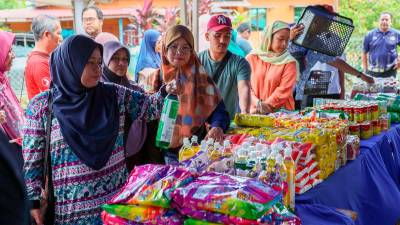PETALING JAYA: Budget 2026 puts the family front and centre, with the Sumbangan Tunai Rahmah (STR) and Sumbangan Asas Rahmah (Sara) programmes anchoring the government’s promise of social protection and inclusive growth, said economist Dr Mohamad Idham Md Razak.
He said the two schemes go far beyond short-term handouts and are designed to ease daily pressures on low-income households through steady, targeted support.
“With monthly Sara aid of up to RM200 for the poorest families, plus the STR payments, households can cover essentials such as food, medicine and school supplies without turning to costly borrowing or cutting corners on nutrition and education.”
He added that unlike blanket subsidies, the Sara scheme limits spending to basic goods at registered small retailers, including rural kedai runcit.
“This not only keeps family consumption stable but also pumps life into local economies.”
Mohamad Idham said Sara’s e-voucher system ensures that funds go where they are meant to, with no leakage or misuse, while shaping consumer habits towards meeting necessities.
“The injection of RM15 billion next year into the hands of nine million STR recipients would also boost demand across informal and micro-retail sectors, spurring small-business growth and creating a healthy multiplier effect.”
He said seasonal top-ups such as the RM100 Sara aid for 22 million adults ahead of Ramadan and Chinese New Year would help families manage festive costs without blowing their budgets.
Mohamad Idham said Malaysia’s integrated targeting system built on the e-Kasih database and the National Socioeconomic Register now reaches deep into rural Sabah and Sarawak to ensure that no vulnerable household slips through the cracks.
He welcomed the RM250 million allocation to subsidise logistics for essential goods delivery to areas such as Kudat and Kapit, along with the inclusion of 8,400 small retailers and cooperatives in the Sara network.
“With mobile banking and BSN’s rural outreach, even remote communities are plugged into the safety net.”
He described STR and Sara as “central pillars” of Malaysia’s poverty eradication and inclusive growth strategy under the Madani framework and the 13th Malaysia Plan, complementing upskilling, microfinance and wage-support initiatives.
“The RM15 billion in social aid, funded sustainably through subsidy rationalisation rather than debt, marks a shift from welfare dependency to empowerment with dignity. It’s about giving people a real second wind, not just a lifeline.”
Malaysia’s historic drop in hardcore poverty to just 0.09% reflects this broader, more disciplined approach that combined cash transfers, job creation in digital, green and agro-industries as well as anti-corruption reforms that enabled the redirection of RM15.5 billion annually into pro-poor spending.
Community projects such as Kampung Angkat Madani have lifted local incomes while institutionalised systems and fiscal discipline ensure the progress sticks.
Prime Minister Datuk Seri Anwar Ibrahim said the overall STR and Sara allocation for 2026 stands at RM15 billion.
All nine million STR recipients will continue receiving Sara aid of up to RM100 monthly while the poorest under the e-Kasih initiative will get RM200 and single individuals will receive RM50.
Meanwhile, 22 million adults will receive Sara aid of RM100 in mid-February.
With the food poverty line now at RM1,236, Anwar expects the remaining hardcore poor – some 7,000 households – to rise above the line by year-end, marking a milestone in Malaysia’s journey towards shared prosperity.
